2017 Programs
Most Recent First
Most Recent First
CHICO CREEK NATURE CENTER
ECO 441 DECEMBER 26, 2017
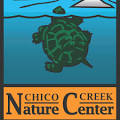
Our guest was Caitlin Reilly, Director of the Chico Creek Nature Center, located in Bidwell Park. She told us about their range of programs for people of all ages, from preschoolers to octogenarians and more: classes, camps, workshops, exhbits, teacher training, classroom excursions and even birthdays and weddings. She also told us about the Center's new California Naturalist Certification Program beginning in March. The 40-hour course combines a science curriculum with guest lecturers, field trips and project-based learning to explore the unique ecology and natural history of the Big Chico Creek watershed. Eight evening classes will be held at Chico Creek Nature Center and four required field days will be held at Big Chico Creek Ecological Reserve, in Bidwell Park and the surrounding area
For more info on the Certification program, go to http://www.chicorec.com/california-naturalist-certification. More details about the Center are at http://www.chicorec.com/chico-creek-nature-center.
Listen to the program. Click below.
For more info on the Certification program, go to http://www.chicorec.com/california-naturalist-certification. More details about the Center are at http://www.chicorec.com/chico-creek-nature-center.
Listen to the program. Click below.
AQUALLIANCE—PROTECTING NORTHERN CALIFORNIA WATERS
ECO 440 DECEMBER 19, 2017
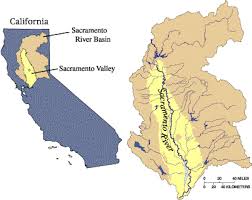
In this program, we spoke with with Barbara Vlamis, Executive Director of AquAlliance, a Chico-based organization that “exists to defend northern California waters and to challenge threats to the hydrologic health of the northern Sacramento River watershed.” First we asked her about recent developments in the Twin Tunnels project that would pipe water from the Sacramento River in the north to big agriculture projects in the south. In particular, we asked about her recent testimony submitted to the State Water Conservation Board challenging the plans of Department of Water Resources and the Bureau of Reclamation, especially their failure to address the impacts of this proposed project on our watershed. And then we asked her about the Sites Reservoir project that would collect so-called “surplus” water in wet years and store it west of Maxwell. While the project has some support in political and agricultural circles, AquAlliance and other groups consider it to be an unwise and possibly even foolish project. You can learn more about AquAlliance and make a contribution at <aqualliance.net>.
Listen to the Program: Click the link.
Listen to the Program: Click the link.
THE WILDERNESS SOCIETY—PROTECTING NATIONAL MONUMENTS
ECO 439 DECEMBER 12, 2017

Our guest on this program was Dan Hartinger, Deputy Director of Parks and Public Lands Defense at the Wilderness Society, where he is the National Monuments Campaign Manager. He spoke to us about Donald Trump’s recent proclamation removing about a million acres of land from protection at the Bears Ears and Grand Escalante National Monuments. Dan explained how national monuments have been created since 1909 by the Antiquities Act, which empowers presidents to set aside land but does not include provisions for presidents like Trump to remove those lands from monument status. He also outlined legal steps the Wilderness Society, a dozen or more environmental groups, and Utah native Americans are doing to stop Trump’s action. Learn more about the Wilderness Society and its efforts to protect and save the wilderness at <wilderness.org>.
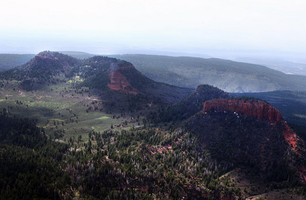
We closed the program by reading a powerful Op-Ed piece by Willie Greyeyes of the Utah native American coalition defending the monuments stating that Bears Ears and Escalante are places for healing, not conflict. <https://www.deseretnews.com/article/865680391/Op-ed-Bears-Ears-A-place-for-healing-not-conflict.html>
Listen to the program, click below.
Listen to the program, click below.
PERMACULTURE IN ACTION
ECO 438 DECEMBER 5, 2017

Our guest on this program was Matthew Trumm, a designer, educator, and consultant on permaculture design and owner and founder of Treetop Permaculture in Oroville. He spoke with us on topics ranging from how he has created a 1/3 acre piece of land at his home into what is a model and workshop site for permaculture education. He also told us about projects being done in downtown Oroville both to use restaurant food scraps and to create permaculture spots in the center of town. Matthew’s interests go far beyond Oroville, and he shared stories about permaculture projects around the world and his own vision of how permaculture practices can lead to sustainability and secure food supplies for coming generations. You can learn more about Matthew and his work at www.treetoppermaculture and see demonstrations at youtube.com/user/treetopermaculture.
Listen to the program. Click on the link.
Listen to the program. Click on the link.
ALL'S WELL—WHERE THOU ART EARTH AND WHY
ECO 437 28 NOVEMBER 2017
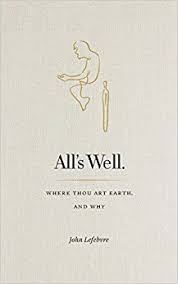
Our guest, John Lefebvre, lives in Canada and is a former attorney and entrepreneur, and he is a performing musician and philanthropist as well. He's written a book titled All's Well: Where Thou Art Earth and Why. It's a discussion of human foibles and immorality, an expose of Earthlings' arrogance in assuming they are alone in the universe and the smartest of living creatures. John is co-founder of DeSmog Blog, which monitors environmental issues; founding director of the David Suzuki Institute; and a founding supporter of the Dalai Lama Centre for Peace and Education in Vancouver. He lives on Salt Spring Island, British Columbia, with his family. The book begins: “It only takes Simple Arithmetic for us to plot sufficiently our place in infinity and in eternity. Where we stand compared to our ideals is less easily contrived.” To learn more about John’s “simple arithmetic,” the “Miscalculation of Trillions,” the “Miscalculation of Zero,” and why “All’s Well,” listen to the program (or buy the book!). You can also read excerpts at http://johnlefebvre.com/alls-well/
Click below to hear the program.
Click below to hear the program.
WHITEWASH—MONSANTO AND ROUNDUP
ECOTOPIA 436 21 NOVEMBER 2017
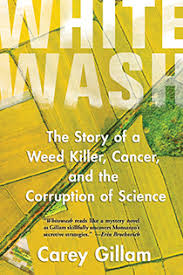
Our guest on this program was investigative journalist Carey Gillam, who has been writing about corporate America for over twenty-five years. Her new book is about Monsanto, and it is called WHITEWASH: THE STORY OF A WEED KILLER, CANCER, AND THE CORRUPTION OF SCIENCE. It explores the history and (over)use of glyphosate, the generic name of Monsanto's Roundup, including the development of Roundup-resistant genetically modified plants and the emergence of superweeds that are not vulnerable to glyphosate. Her book describes in great detail how Monsanto promotes disinformation about its product and puts pressure on global agencies, scientists, and even journalists to whitewash negative research about this "probable human carcinogen." Carey is a former senior correspondent for Reuters' international news service, where she wrote on biotech crop technology, agrichemicals, pesticides, and the environmental effects of food production. She is currently the Research Director for U.S. Right to Know, a nonprofit dedicated to educating consumers about the dark side of our food production. Among organizations fighting Monsanto are Moms Across America <momsacrossamerica.com>, GMO Free California <www.gmofreeca.org/>, and US Right to Know <https://usrtk.org>, where Carey is Executive Director. You can follow Carey and her work at twitter.com/careygillam and www.careygillam.com. The book is available at Amazon, Barnes and Noble, and elsewhere. Island Press is the publisher.
Listen to the interview—click on the link below.
Listen to the interview—click on the link below.
ECOTOPIA 435 WAR AND THE ENVIRONMENT
NOVEMBER 14, 2017
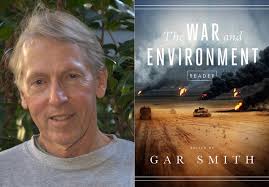
Our guest was Gar Smith, an award-winning investigative reporter and editor of The War and Environment Reader, published by Just World Books. He is an investigative journalist and founder of Environmentalists Against War. The book includes over fifty essays, including such well-know authors as Margaret Mead, Medea Benjamin, Jane Goodall, and Daniel Ellsberg. He spoke with us about the origins of humans' warlike impulses, the cost of war to both the economy and the environment, and some ways in which activists can attempt to regain control of the military and our planet. Gar Smith is a veteran of Berkeley's Free Speech Movement, a draft resister, and an antiwar protestor who once faced a federal trial for blocking a napalm truck. He has participated in environmental campaigns in Japan, Denmark, Britain, and Germany and has written for Mother Jones, The Ecologist, Truthout, Common Dreams, and AlterNet.
Perhaps the best way to introduce Gar Smith is to quote from the introduction to this collection of essays. He writes:
“Even before war breaks out, the Earth suffers. Minerals, chemicals, and fuels are violently wrested from Earth's forests, plains, and mountains. Much of this bounty is transformed into aircraft, gunboats, bullets, and bombs that further crater, sear, and poison the land, air, and water of our living planet. War is, and always has been, nature's nemesis.”
Listen to the program. Click the link below.
Perhaps the best way to introduce Gar Smith is to quote from the introduction to this collection of essays. He writes:
“Even before war breaks out, the Earth suffers. Minerals, chemicals, and fuels are violently wrested from Earth's forests, plains, and mountains. Much of this bounty is transformed into aircraft, gunboats, bullets, and bombs that further crater, sear, and poison the land, air, and water of our living planet. War is, and always has been, nature's nemesis.”
Listen to the program. Click the link below.
ECOTOPIA 433 THE RETRO FUTURE
OCTOBER 24, 2017
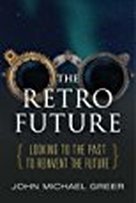
In this program we looked at Ecotopian issues through the perspective of John Michael Greer, who questions whether “new” necessarily means “better” or “improved” and who recommends that we might want to go back to some older technologies and values that worked (or seem to have worked) quite satisfactorily. He is an “historian of ideas” who, among other interests, is exploring “the future of industrial society.” He has written books on a wide range of topics, including Druidism (where he is credentialed as “The Archdruid”), as well as ecology, spirituality, and history. His new book, just released by New Society Publishers, is The Retro Future: Looking to the Past to Reinvent the Future, where he seriously challenges what he calls “the ersatz religion of progress.” You can learn much more about his work, including his blog, nonfiction, fiction, and podasts at http://www.ecosophia.net.
LISTEN TO THE PROGRAM; CLICK BELOW
LISTEN TO THE PROGRAM; CLICK BELOW
ECOTOPIA 432 GOOD FOOD NOW
OCTOBER 18, 2017

Our guest on this program was Pamm Larry, well known for her activism in Chico, in California, and across the U.S. Originally focusing on the Label GMOs campaign, Pamm has continued to work for healthy food and is now establishing the Good Food Network, devoted to building a healthy local food system in Butte County as a part of the national Good Food Brigade. In the interview she shows her extraordinary knowledge of food issues ranging from Big Ag and Big Chemicals to the viability and future of local food systems. We feel extraordinarily fortunate to have her in our community.
LISTEN TO THE PROGRAM.
DOWNLOAD THE PROGRAM
LISTEN TO THE PROGRAM.
DOWNLOAD THE PROGRAM
ECOTOPIA 431 AQUALLIANCE AND THE TWIN TUNNELS
SEPTEMBER 17, 2017
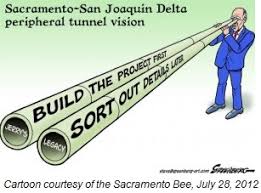
Our guest was Barbara Vlamis, Executive Director of AquAlliance, the organization dedicated to protecting Northern California Waters. Barbara told us about a law suit being filed by AquAlliance and several of its allies in response to the Department of Water Resources' effort to bypass citizen input and issue itself a blank check to build Jerry Brown's Twin Tunnels. She helped us understand the complexities of legal maneuvering on this issue and shared breaking news that one of the biggest water districts in has withdrawn its support from the Twin Tunnels project, putting its financial support in great jeopardy. There's just too much information to summarize in a brief note. Listen to the program. Contribute to AquAlliance at aqualliance.net.
Listen.
Download.
Listen.
Download.
ECOTOPIA 432 THE STAGES OF COLLAPSE
SEPTEMBER 24, 2017
We interviewed Dmitry Orlov about his book The Five Stages of Collapse--Survivors' Toolkit. He outlined his view that we are on the way to economic, commercial, political, social, and cultural collapse, and he offered ideas about how life on the planet will change for all of us under collapse. Dmitry has had careers in physics, e-commerce, and internet security, but in recent years, he has been particularly interested in studying how societies collapse, not only in the Soviet Union, from which he and his family emigrated in the seventies, but in the U.S. and numerous other countries around the globe. In addition to being the author of many books, Dmitry maintains a blog [http://cluborlov.blogspot.com/]. The book is published by New Society
ECOTOPIA 429 SEPTEMBER 5, 2017
CATASTROPHES RECONSIDERED
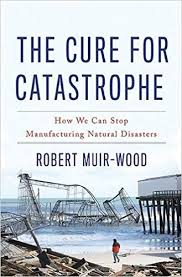
In the aftermath of Hurricane Harvey in Texas, we decided to replay an interview done last year. Our guest on this program was Robert Muir-Wood, speaking with us from London. He is the chief research office of a company called “Risk Management Solutions.” He also teaches at University College London's Institute for Risk and Disaster Management. His book is entitled The Cure for Catastrophe: How We Can Stop Manufacturing Natural Disasters, published by Basic Books. Robert argues that although natural disasters are inevitable, we can take steps to predict, prepare for, and respond to them in ways that can save lives and partially avoid destruction. During the interview he talked with us about some of the historical spiritual or superstitious responses to disasters, about the emergence of scientific study of catastrophes, about a rewriting of the “Three Little Pigs” to reflect what we know about construction techniques, and about how contemporary computer modeling is providing deeper understanding and anticipation of natural disasters. Robert also told about “Dr. Resilience,” who offers a way to respond to disasters, offered a glimpse into what risk analysis may be like in 2030.
Listen to the interview: Click below.
Listen to the interview: Click below.
ECOTOPIA 428 AUGUST 15, 2017
WHEN THE SUN GOES DARK
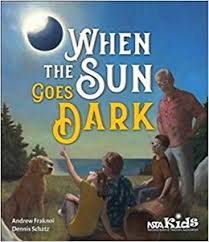
Our guest on this program was Andrew Fraknoi, Chair of the Astronomy Department at Foothill College in Los Altos, south of San Francisco. Andrew is a science educator who likes to interpret astronomical discoveries and ideas in everyday language and has developed numerous educational programs, magazines, and a children's book for professional and amateur astronomers. In the first half of the spoke with us about the coming total eclipse of the sun, including information on how to view it safely. He has written a book for children called When the Sun Goes Dark, cauthored with Dennis Schatz and published by the National Science Teachers Association, which includes explanations of eclipses as well as information on viewing. The book is available as a download from the National Science Teachers Association. www.nsta.org/eclipse
Andrew has served on the Board of Trustees of the SETI Institute for 25 years. SETI is an acronym for the Search for Extraterrestrial Intelligence, and the institute is a scientific and educational organization based in Mountain View devoted to the search for life elsewhere in the universe. He spoke with us about the history of that project as well as new technologies and approaches the Institute is taking as part of the search. We found Andrew to be an energetic and impassioned spokesperson for science and loved having him on the program.
To listen to the program, click here.
To download it to your computer, click here.
Andrew has served on the Board of Trustees of the SETI Institute for 25 years. SETI is an acronym for the Search for Extraterrestrial Intelligence, and the institute is a scientific and educational organization based in Mountain View devoted to the search for life elsewhere in the universe. He spoke with us about the history of that project as well as new technologies and approaches the Institute is taking as part of the search. We found Andrew to be an energetic and impassioned spokesperson for science and loved having him on the program.
To listen to the program, click here.
To download it to your computer, click here.
ecotopia 427 august 8, 2017
ecotopia revisited
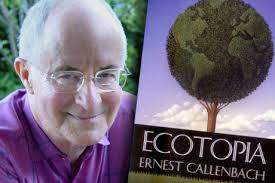
In this program, we we replayed an interview we conducted in 2010 with Ernest Callenbach, whose science fiction/utopian novel, Ecotopia, inspired the name for this program. (And we want to once again thank Jim Reis and Connie Fisher for introducing us to the title and term.)Sadly, Ernest Callenbach passed away in 2012, but his ideas about a utopian society are as valid and challenging today as they were in the '70s, when the book was first published. In the interview, we asked Mr. Callenbach about the writing of the novel, but also about his views of the current state of social, political, and technological ecosystems.
Ecotopia was published and 1975 and became an instant classic in the science fiction and utopian genres. It is set in the future and is based on the premise that Northern California, Oregon, and Washington have seceded from the United States in order to form a more perfect union.
The Ecotopians have tackled a wide range of social, environmental, and economic problems, from food and sewage to energy and pollution to recycling to transportation to education to equality of sex and race. The novel is told from the point of view of William Weston, a newspaper writer, who is the first American permitted into Ecotopia in over twenty years, and the book consists of his journal entries and his dispatches back to his newspaper in the U.S.
Initially skeptical, Weston becomes more and more convinced of the validity and vitality of Ecotopian thinking, and at the end of the novel, he faces a difficult decision, whether to return to the United States or to remain in Ecotopia. (You’ll have to read the book for yourselves to find out the answer!)
Listen to the interview.
Download the interview.
Ecotopia was published and 1975 and became an instant classic in the science fiction and utopian genres. It is set in the future and is based on the premise that Northern California, Oregon, and Washington have seceded from the United States in order to form a more perfect union.
The Ecotopians have tackled a wide range of social, environmental, and economic problems, from food and sewage to energy and pollution to recycling to transportation to education to equality of sex and race. The novel is told from the point of view of William Weston, a newspaper writer, who is the first American permitted into Ecotopia in over twenty years, and the book consists of his journal entries and his dispatches back to his newspaper in the U.S.
Initially skeptical, Weston becomes more and more convinced of the validity and vitality of Ecotopian thinking, and at the end of the novel, he faces a difficult decision, whether to return to the United States or to remain in Ecotopia. (You’ll have to read the book for yourselves to find out the answer!)
Listen to the interview.
Download the interview.
ECOTOPIA 426 AUGUST 1, 2017
NORTHERN CALIFORNIA WATERS REVISITED
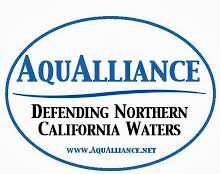
In this program, Steve interviewed Barbara Vlamis, Executive Director of AquAlliance, "Defending Northstate Waters." Barbara has been a frequent guest on this program, and she gave us an update on four major northstate water concerns:
1) The Twin Tunnels, a favorite project of Governor Brown, who recently accepted Department of Water Resources approval of environmental studies, giving groups like AquAlliance just thirty days to file lawsuits (which they will).
2) A recent court victory that will require the U.S. Bureau of Reclamation and the San Luis Delta Mendota Water Authority to submit new data on the impacts of proposed transfers that would take between 600 and 800 thousand acre feet from the north annually.
3) The status of the Sites Reservoir project, which would store "excess" water in wet years and ship it south (via the proposed Twin Tunnels) to the powerful and affluent water districts in the south.
4) Oroville Dam problems and concerns, in particular, distrust of the Department of Water Resources as it demolishes the old spillway, designs a new one, and remains largely dismissive of citizen concerns.
AquAlliance is the major advocate and litigant in northstate water issues and deserves our financial support. Learn more and/or donate at aqualliance.net.
Listen to the program by clicking on the link below.
1) The Twin Tunnels, a favorite project of Governor Brown, who recently accepted Department of Water Resources approval of environmental studies, giving groups like AquAlliance just thirty days to file lawsuits (which they will).
2) A recent court victory that will require the U.S. Bureau of Reclamation and the San Luis Delta Mendota Water Authority to submit new data on the impacts of proposed transfers that would take between 600 and 800 thousand acre feet from the north annually.
3) The status of the Sites Reservoir project, which would store "excess" water in wet years and ship it south (via the proposed Twin Tunnels) to the powerful and affluent water districts in the south.
4) Oroville Dam problems and concerns, in particular, distrust of the Department of Water Resources as it demolishes the old spillway, designs a new one, and remains largely dismissive of citizen concerns.
AquAlliance is the major advocate and litigant in northstate water issues and deserves our financial support. Learn more and/or donate at aqualliance.net.
Listen to the program by clicking on the link below.
ECOTOPIA 425 JULY 25, 2017
student activism: middle east and north Africa
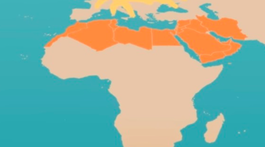
In this program, we were pleased to welcome six students from the Middle East and North Africa (the acronym is MENA) who participated in a program at Chico State sponsored by the US Department of State. The Student Leaders program offers outstanding undergraduates from across the MENA region an intensive leadership training course of approximately six weeks in the United States. The program emphasizes lessons in participatory governance and the application of leadership skills. There are about 120 participants in the program nationwide and 20 were here in Chico. These incredibly articulate, smart students told us about their experiences in the program and about projects they will be conducting back in their home countries. The young people were enthusiastic in their praise for their CSU faculty instructors, and, especially, Bethany Pinegar, who arranged this great interview for us. To learn more about the program, go to https://mepi.state.gov/opportunities/mepi-exchange-programs/student-leaders.html
Listen to the Program.
Download a copy of the Program.
Listen to the Program.
Download a copy of the Program.
ECOTOPIA 424 JULY 4, 2017
SAVING HAWAII'S REEFS AND FISH
DEMOCRACY ON THE 4TH OF JULY
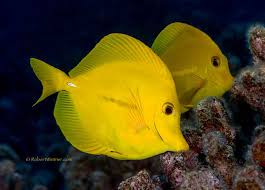
In this two-part program, we spoke first with Robert Winter from Hawaii. Robert also goes by the name of Snorkel Bob, and we've enjoyed talking with him on several shows about his beautiful books of underwater photography in Hawaii and Cuba. We last had him on the line in February, when he told us about Hawaii's bill SB1240, which would restrict aquarium trade extractions from Hawaiian waters. In the interview Robert described the arduous democratic process that went into creating this bill and wrangling it through the legislature only to have Governor David Ige threaten to veto it. Robert explains the many forces—though not majority voices—at work on this issue. If you would like add your voice on this legislation (and Snorkel Bob says all voices are important), you can contact Governor David Ige— [email protected], 808-586-0034. Another important contact is one of the governor’s advisors, Brando Asuka: [email protected]. Also check out the One Reef page at snorkelbob.com.
To listen to the program, click here.
Or to download it to your computer, click here
To listen to the program, click here.
Or to download it to your computer, click here

In the second half of of the program, we were pleased to welcome fellow KZFR programer Sue Hilderbrand, who does “The Real Issue” Wednesday nights. It's an important show that looks into pressing political and social issues of our time. Sue also teaches Political Science classes at Butte College and Chico State. On her program, she mostly asks guests about issues and problems; tonight we thought we'd give her a chance to voice her own opinions, and we gave her a big, fat question: What is the State of the Union on the Fourth of July 2017. We also asked her to talk about her forthcoming documentary film, "American Totem," which explores myriad social, cultural, mythological, and legal issues surrounding the debates over firearms in America. You can learn more about that project (and help support funding the film) at http://www.afrayednation.org. Or watch the short "sizzle reel" at:
https://www.youtube.com/watch?v=mGUMAkIcLpk
There's a lot to listen to in that interview.
To listen, click here.
To download, click here.
https://www.youtube.com/watch?v=mGUMAkIcLpk
There's a lot to listen to in that interview.
To listen, click here.
To download, click here.
ECOTOPIA 423 27 JUNE 2017
LIVING AND CHILDREARING IN THE NEVADA DESERT
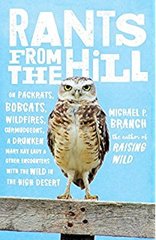
Our guest was writer Mike Branch, who writes about the ecosystem of the Nevada desert and some of the people and critters that share that space with him and his family. One of his two new books is titled Rants from the Hill, with the intriguing subtitle On Packrats, Bobcats, Wildfires, Curmudgeons, a Drunken Mary Kay Lady, and Encounters with the Wild in the High Desert. His other new book is called Raising Wild: Dispatches from a Home in the Wilderness, and it includes some of his reflections on living on a remote mountain north of Reno with his wife, Eryn and daughters Hannah Virginia and Caroline Emerson. Both books are published by Roost Books of Shambahala Publications.
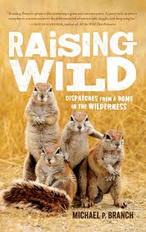
Mike is a colleague of ours from our teaching days at the University of Nevada, Reno, where he is Professor of Literature and the Environment and co-founder of UNR's outstanding literature and the environment program. He has published many books and articles on environmental lit, but in recent years has turned his pen to creative nonfiction, resulting in these two books as well as articles in such magazines and journals as Orion, Ecotone, Slate, Hawk and Handsaw, Whole Terrain, High Country News, and Utne Reader.
Learn more about Mike and order copies of the books at michaelbranchwriter.com/
Listen to this highly engaging interview; click below.
Learn more about Mike and order copies of the books at michaelbranchwriter.com/
Listen to this highly engaging interview; click below.
ECOTOPIA 418 6 JUNE 2017
THE CLEAN MONEY REVOLUTION
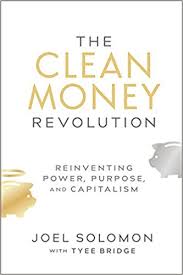
Our guest on this program was Joel Solomon, who, with Tyee Bridge, has written The Clean Money Revolution, just published by New Society. The subtitle of the book is Reinventing Power, Purpose, and Capitalism. For many years Joel Solomon has been working to put big money to use in serving humankind rather than exploiting it. Joel is an investor and a progressive, and believes that capitalism can promote radical changes in social justice and the environment. He is co-founder and Chair of Renewal Funds, Canada's largest mission venture capital firm, with $98 million under management in organics and envirotech companies. Since the 1970s, he's been a financial activist, and among other positions, he is the Board Chair of Hollyhock, a cultural and educational retreat on Cortes Island, British Columbia. In a wide ranging interview, we asked about the concept of “clean money,” examples of clean money in action, barriers to widespread acceptance, and finally, what Joel would do to change the planet if he had $100 trillion (a question he poses for himself in the book). We also asked him what those of us with smaller change can do to use our money as a tool for social and environmental change.
Listen to the program. Click below.
Listen to the program. Click below.
ECOTOPIA 417 MAY 30, 2017
CITIZENS' CLIMATE LOBBY

This week we spoke with Eric Nilsson and Gordon Gregory of the Chico Citizens’ Climate Lobby. They are part of a national movement to introduce legislation for a “carbon fee and dividend” program that is an alternative to the “carbon tax” proposed to reduce carbon emissions. They explained that the “fee” would be assessed “at the source of extraction” of fossil fuels and that the “dividend” would be paid to the citizens. They explained how the fee and dividend mechanism would work to reduce fossil fuel carbon releases to below 1995 levels, far lower than the Paris accords and current California legislation. They also urged listeners to contact Representative Doug LaMalfa and urge him to join the Carbon Caucus in DC. You can learn more at the national Citizen’s Climate Lobby at https://citizensclimatelobby.org, which includes links to the Chico Chapter.
Listen to the program.
Listen to the program.
ECOTOPIA 416 MAY 23, 2017
OROVILLE DAM AND NORTHERN CALIFORNIA WATERS

The near catastrophe at Oroville Dam was the focus of this program, leading to a discussion of the broader issues involving our limited water supply. Our guest was Barbara Vlamis, Executive Director of Aqualliance, “defending northern California waters.” Barbara is an outspoken critic of the Department of Water Resources, not only for its handling of Oroville dam and the crisis, but for its prioritizing the alleged needs of the large water districts over the needs and interests of the people. After talking about the failures at Oroville, she went on to discuss issues of preservation and conservation of water in the wake of an unusually wet winter. She assured us that the long-range issues remain and that Aqualliance is continuing in its efforts to ensure transparency and, as needed, to litigate against those who would appropriate our water. Learn more about Aqualliance at aqualliance.net.
Listen to the program.
Listen to the program.
XTRA: I'M RIGHT AND YOU'RE AN IDIOT
MAY 16, 2017
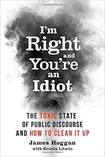
This show is a replay of one we conducted a few months ago with James Hoggan. We were really impressed with the logic of his book, subtitled The Toxic State of Public Discourse and How to Clean It Up. Given the super toxic state of discourse since the advent of the Trumpian era of fake news, alternative facts, and government officials who cannot be expected to be 100% accurate, we felt Hoggan's advice deserves a rehearing.
Listen to the program; click below.
Listen to the program; click below.
|
|
|
ecotopia 415 the vegetarian's guide to eating meat
MAY 9, 2017
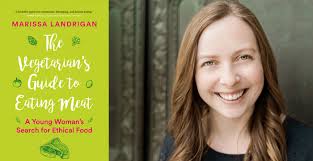
Our guest on this program was Marissa Landrigan, author a new book titled The Vegetarian's Guide to Eating Meat: A Young Woman's Search for Ethical Food (Greystone Books, 2017). Marissa grew up in Massachusetts, is a graduate of Ithaca College in upstate New York, received her MFA in Creative Writing and Environment from Iowa State University, and currently teaches at the University of Pittsburgh-Johnstown. Her writing has also appeared in Atlantic, Salon, Guernica, and Orion. In The Vegetarian’s Guide she describes her journey growing up as a meat eater, turning to vegetarianism for a number of years for ethical reasons, and then cautiously returning to meat eating as part of her search for an ethical diet. She’s a creative writer and read two segments of the book to us: one a graphic description of events in a slaughterrhouse, the other telling about her efforts to learn how to cut up a chicken. You can learn more about her work at https://marissalandrigan.com.
Listen to the program: Click below.
Listen to the program: Click below.
ECOTOPIA 414 PROCESSION OF THE SPECIES
MAY 2, 2017
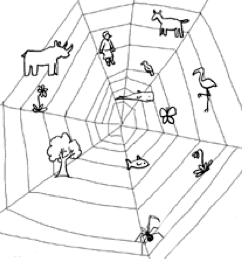
Each year we work with Chico area kids (and adults) to create puppets of endangered species. The puppets (and kids and adults) then join us for the Procession of the Species Parade as part of the Butte Environmental Council's Endangered Species Faire. This year over 300 people marched in the parade on behalf of endangered critters. On this program we interviewed young people and their teachers from Sherwood Montessori and Wildflower Charter about their research into endangered animals. Don't fail to listen to these impressive comments from young people who care about the future of the planet and the animals that inhabit it.
Listen to the program; click below.
Listen to the program; click below.
ECOTOPIA 413 MARCH FOR SCIENCE AND SCIENCE ETHICS
APRIL 18, 2017
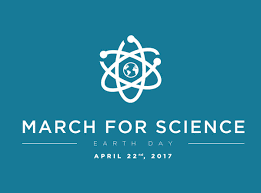
Tonight our topic was science. An ongoing conversation in the Millennium Alliance for the Biosphere and Humanity, Paul Ehrlich's MAHB, raises the concern that the public—especially the voting public—may not value science sufficiently or be able to thoughtfully discuss current science issues. And we've seen lots of reasons to share that concern, especially climate change denial, an attitude that is being spread by Donald Trump and his “science” team.
Steve spoke first with two CSU faculty members who organized Chico's March for Science. Dr. Becki Brunelli is a north state native, who started her career teaching elementary school and science education, but then earned a PhD from UC Davis in Animal Behavior and currently teaches in the Department of Biological Sciences at Chico State. Becki believes that everyone is born a scientist, with a natural curiosity to learn, explore, and test ideas. Also in the studio was Dr. LaDawn Haws who grew up around the world, living in Afghanistan, India, Brazil and the Philippines. She earned a PhD in Mathematics from UC Davis and has been at Chico State since 1988. LaDawn has also been involved in informal K12 science education for the last 20 years, including working with the Hands On Lab at Chico State campus, and putting on several interactive exhibits at the Gateway Science Museum.
Click to listen to the interview; scroll down for the second half of the program.
Steve spoke first with two CSU faculty members who organized Chico's March for Science. Dr. Becki Brunelli is a north state native, who started her career teaching elementary school and science education, but then earned a PhD from UC Davis in Animal Behavior and currently teaches in the Department of Biological Sciences at Chico State. Becki believes that everyone is born a scientist, with a natural curiosity to learn, explore, and test ideas. Also in the studio was Dr. LaDawn Haws who grew up around the world, living in Afghanistan, India, Brazil and the Philippines. She earned a PhD in Mathematics from UC Davis and has been at Chico State since 1988. LaDawn has also been involved in informal K12 science education for the last 20 years, including working with the Hands On Lab at Chico State campus, and putting on several interactive exhibits at the Gateway Science Museum.
Click to listen to the interview; scroll down for the second half of the program.
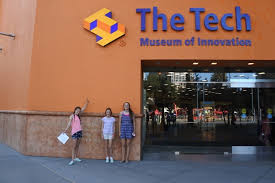
ClSteve's second guest was Tim Ritchie, the CEO of The Tech Museum of Innovation in San Jose. It is a family-friendly interactive science and technology center in San Jose. He spoke about The Tech's history and its strong commitment to helping people of all ages engage with issues of science, technology, and ethics in imaginative ways. Tim Ritchie joined The Tech Museum in 2011 after serving as the president and CEO of the a science center in Birmingham, Ala. Prior to that, he practiced law, led education programs in a large public housing community, and led an organization that creates employment opportunities for adults with disabilities. The Tech Museum of Science and Technology is in San Jose. It's not that far from Chico and would make a great family excursion. If you can't get there immediately, check out the Tech website at <https://www.thetech.org>. Click below to listen to the interview.
ECOTOPIA 412 PERMACULTURE IN OROVILLE
APRIL 11, 2017

In this program, we interviewed Matthew Trumm, a permaculture specialist living in Oroville. With permaculture training in Australia and 5000 hours of permaculture design, Matt has his own business, TreeTop Permaculture, and offers a variety of workshops as well as a demonstration garden on High Street, Oroville. He also has highly creative ideas about what can be done using permaculture to restore waterways such as our damaged Feather River and even to avoid having to build dams in the first place. With some of his “eager beaver” students, he is exploring options for our area in the wake—pun intended—of the Oroville Dam crisis. We found his energy, enthusiasm, and bright ideas quite persuasive and inspiring. Check out his work at www.treetoppermaculture.org/.
Listen to the interview; click below.
Listen to the interview; click below.
ECOTOPIA 411 ART AND ACTIVISM
MARCH 28, 2017
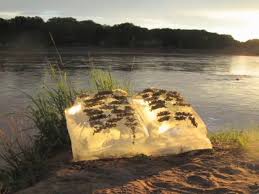
On this program, our “ecosystem” was works of art and how they can intersect with the world of environmental activism. Our guest on the phone from New Mexico was Basia Irland, who does amazing art work out in the field to focus on international water issues, especially rivers, waterborne diseases, and water scarcity. We spoke with her about “Ice Books” (pictured), which carry seeds down troubled rivers to foster growth; contemplation places where one can meditate; and backpack/repositories, which contain river vessel canteens, logbooks, maps, video documentaries, and photographs. Over the past three decades she has created projects in Africa, Canada, Europe, South America, Southeast Asia, and the United States. As an artist, she works with scholars from diverse disciplines building rainwater harvesting systems; connecting communities and fostering dialogue along the entire length of rivers; filming and producing water documentaries; and creating waterborne disease projects around the world, most recently in Egypt, Ethiopia, India, and Nepal. Check out her great work and art at basiairland.com. Listen to our interview with Basia—click below.

Then we spoke Cory Trépanier, an artist/explorer/filmmaker living in Caledon, Ontario, who has carried his easel into some of the most remote regions on our planet to create remarkable oil paintings of Canada’s wilderness. The culmination of a decade-long project, Trépanier’s Into the Arctic Exhibition Tour is now bringing his collection of over 50 Arctic oil paintings and 3 films to museums across the United States. These works were created from four expeditions to the furthest reaches of the Canadian north, and includes his 15 foot wide “Great Glacier”, the centrepiece of the collection and quite possibly the largest Arctic landscape painting in Canada’s history. We asked him about his work and how he sees it as promoting activism. Listeners can learn more about your Into The Arctic project at https://www.intothearctic.ca and see his work at http://www.trepanieroriginals.com. Listen to the interview by clicking the link below.
ECOTOPIA 409 this way to sustainability
March 14, 2017
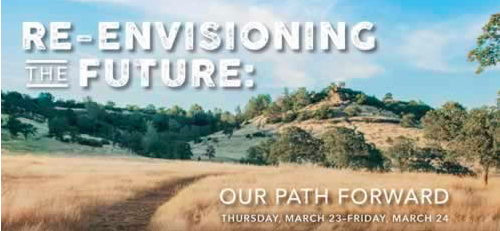
This was the second in our series of programs focusing on the This Way to Sustainability Conference at Chico State, March 23 and 24. Susan Tchudi conducted interviews with two of the keynote speakers. For more conference info go to https://www.csuchico.edu/sustainablefuture/conference/
Susan's first guest was Tom Newmark. Tom spent fourteen years in the natural products industry, helping to build New Chapter into a premier brand in the natural retail channel. Proctor & Gamble purchased New Chapter about four years ago, and since that time Tom has focused on environmental activism with specific attention on regenerative agriculture. He is also the co-owner of Finca Luna Nueva Lodge, a Demeter-certified Biodynamic farm and ecolodge in Costa Rica that teaches regenerative agriculture. Tom is board chair of the American Botanical Council, the co-founder and board chair of The Carbon Underground, board chair of the Greenpeace Fund USA, c0-founder and steering committee member of Regeneration International, and was the founder and board chair of Sacred Seeds.
Susan's next guest was Dune Lankard. Dune is an Alaska Athabaskan Native from the Eyak tribe with a distinguished history of community and environmental activism. Dune began as subsistence and commercial fishing in the Copper River Delta and Prince William Sound until the1989 Exxon Valdez oil spill devastated the region. Dune became an activist. As a commercial fisherman, tribal leader and committed conservationist, Dune founded the Copper River Wild Salmon Company and works with local fishermen on sustainable practices. He is the founder and chair of the NATIVE Conservancy Land Trust and the Cordova-based Eyak Preservation Council. In his new role with the Center for Biological Diversity, Lankard will help the Center continue its work in Alaska to preserve habitat for salmon and other wildlife, prevent destructive logging practices in the Tongass National Forest, protect endangered species such as the polar bear and Cook Inlet beluga, and help Alaskans stop new offshore-oil projects and deal with the effects of climate change.
Listen to the progam—click on the link below.
Susan's first guest was Tom Newmark. Tom spent fourteen years in the natural products industry, helping to build New Chapter into a premier brand in the natural retail channel. Proctor & Gamble purchased New Chapter about four years ago, and since that time Tom has focused on environmental activism with specific attention on regenerative agriculture. He is also the co-owner of Finca Luna Nueva Lodge, a Demeter-certified Biodynamic farm and ecolodge in Costa Rica that teaches regenerative agriculture. Tom is board chair of the American Botanical Council, the co-founder and board chair of The Carbon Underground, board chair of the Greenpeace Fund USA, c0-founder and steering committee member of Regeneration International, and was the founder and board chair of Sacred Seeds.
Susan's next guest was Dune Lankard. Dune is an Alaska Athabaskan Native from the Eyak tribe with a distinguished history of community and environmental activism. Dune began as subsistence and commercial fishing in the Copper River Delta and Prince William Sound until the1989 Exxon Valdez oil spill devastated the region. Dune became an activist. As a commercial fisherman, tribal leader and committed conservationist, Dune founded the Copper River Wild Salmon Company and works with local fishermen on sustainable practices. He is the founder and chair of the NATIVE Conservancy Land Trust and the Cordova-based Eyak Preservation Council. In his new role with the Center for Biological Diversity, Lankard will help the Center continue its work in Alaska to preserve habitat for salmon and other wildlife, prevent destructive logging practices in the Tongass National Forest, protect endangered species such as the polar bear and Cook Inlet beluga, and help Alaskans stop new offshore-oil projects and deal with the effects of climate change.
Listen to the progam—click on the link below.
ecotopia 408 Sustainability, the law, and student engagement
March 7, 2017
In this program we interviewed two of the major speakers at the forthcoming Chico State University conference, “This Way to Sustainability.”
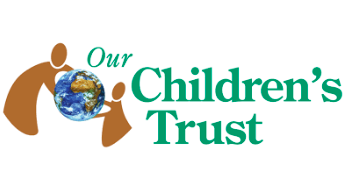
First we spoke with Mary Wood, law professor at the University of Oregon and Director of the Environmental and Natural Resources Law Center at the University of Oregon. We were especially interested to hear about her program of Atmospheric Trust Litigation, a legal process she has developed to sue environmental abusers for the harm they are causing to the future. Particularly important to note is that the litigants in these cases are children, whose future will be profoundly affected by pollution produced today. Lawsuits have been filed all over the world, with a high success rate. Learn more about the process at the website for Our Children's Trust <https://www.ourchildrenstrust.org>.
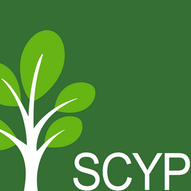
Then we talked with Marc Schlossberg, Professor City and Regional Planning and codirector of the Sustainable Cities Initiative at the University of Oregon. He told us about his Educational Partnership for Innovation in Communities (EPIC), which engages students directly in environmentally sound planning in cities, in Oregon, in the US, and around the world. Check out the Sustainable Cities Initiative at <http://sci.uoregon.edu/homepage>.
Listen to the program; click on the link below.
Listen to the program; click on the link below.
ECO 407 CRISES AT THE OROVILLE DAM
28 FEBRUARY 2017
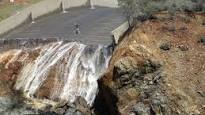
In this program we interviewed two people who have been doing extraordinary work in the wake—pun intended—of the Oroville Dam catastrophe (as Susan remarked, though the dam didn't break, evacuating 180,000 people from their homes is a catastrophe).
First we spoke with Butte County Supervisor Bill Connelly, who has been vocal (and right) in describing the problems, many predictable, that led to the crisis. He reminisced about the Feather River of his boyhood, prior to the dam, when one could ride the rapids right into downtown Oroville! More important, he pointed out the broken promises to the community and the losses it has absorbed: natural beauty, potential tourism, a tax base, and the cost of community services that are not reimbursed. He outlined steps that federal and state authorities and agencies need to take to make this right.
Then we spoke with Anna Kastner, who is Manager of the Feather River Fish Hatchery. During the crisis, she and her staff moved (and literally saved) about seven million salmon fry and steelhead eggs, employing ingenious improvisational strategies to get the fish into safer quarters where they would not be smothered by mud cascading from the dam.
Listen to the program. Click below.
First we spoke with Butte County Supervisor Bill Connelly, who has been vocal (and right) in describing the problems, many predictable, that led to the crisis. He reminisced about the Feather River of his boyhood, prior to the dam, when one could ride the rapids right into downtown Oroville! More important, he pointed out the broken promises to the community and the losses it has absorbed: natural beauty, potential tourism, a tax base, and the cost of community services that are not reimbursed. He outlined steps that federal and state authorities and agencies need to take to make this right.
Then we spoke with Anna Kastner, who is Manager of the Feather River Fish Hatchery. During the crisis, she and her staff moved (and literally saved) about seven million salmon fry and steelhead eggs, employing ingenious improvisational strategies to get the fish into safer quarters where they would not be smothered by mud cascading from the dam.
Listen to the program. Click below.
ECO 406 EARTH WISDOM: JOHN MUIR AND TAOISM
21 FEBRUARY 2017
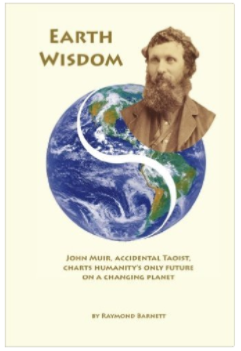
In this program, we interviewed Raymond Barnett, author of new book titled Earth Wisdom, with the subtitle, John Muir, Accidental Taoist, Charts Humanity's Only Future on a Changing Planet. The book tracks the journeys of the founding father of the environmental movement, John Muir, compares his philosophy to that of Taoism, and relates Muir's earth wisdom to our own challenged environment. Ray is a Chico resident and taught biology at Chico State for thirty years. He was instrumental in founding Chico's Gateway Science Museum a few years ago. Ray is also a hiker and a kayaker and has traveled many of the mountains and rivers that Muir explored over a century ago. We found this to be an especially engaging interview, including a choice of two paths for humankind, one of which, as Ray described, is grim indeed.
The book is available at The Bookstore on Broadway in Chico and via Amazon https://www.amazon.com/Earth-Wisdom-Accidental-Humanitys-Changing/dp/1532762372. Learn more about Ray and his work at raymondbarnet.com.
Listen to the program; click on the link below.
The book is available at The Bookstore on Broadway in Chico and via Amazon https://www.amazon.com/Earth-Wisdom-Accidental-Humanitys-Changing/dp/1532762372. Learn more about Ray and his work at raymondbarnet.com.
Listen to the program; click on the link below.
ECO 403 ACTIVISM IN HARD TIMES
7 FEBRUARY 2017
These times of the Trumpian Dystopia are difficult ones for activists with environmental interests, and in this program we spoke with activists who are fighting on against difficult opposition.
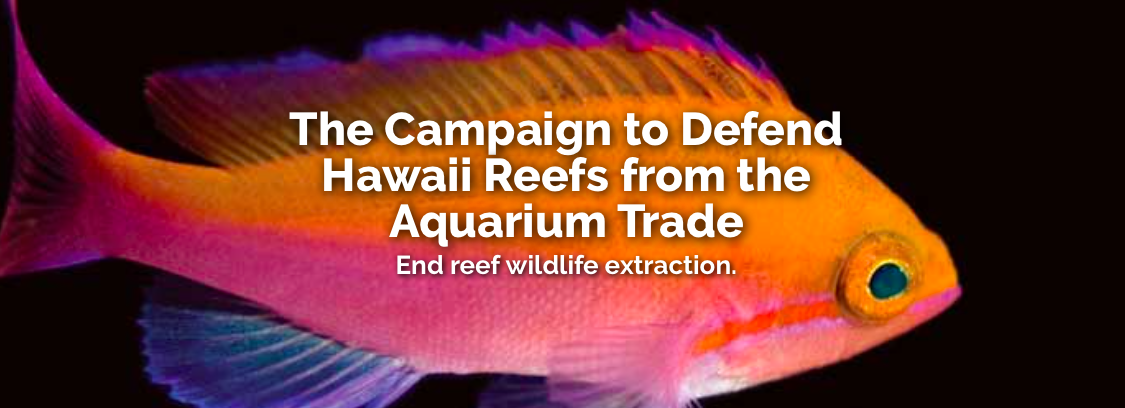
First we spoke with Robert Wintner, who also goes by the pen name of Snorkel Bob. Robert lives and works in Hawaii, where he is a passionate activist defending Hawaii's reefs and tropical fish in the state of Hawaii. He told us about legislation pending in Hawaii that would ban catching tropicals for the aquarium trade, and asked for listeners' help in passing that legislation.
Reef Function Up for Grabs!
Yellow tang and filefish vie for attention from Hawaiian cleaner wrasse, all taken by a voracious aquarium trade!
TESTIFY at www.capitol.hawaii.gov
PLEASE HELP! Now is the time to come to the aid of your reefs. You must register—phone # not necessary, only name & password. Testify once for HB1457 and again for SB1240. Enter the bill # and Go. Click on Submit Testimony and TESTIFY:
YES, I support HB1457 (or SB1240). No more aquarium permits. Freeze existing permits until DLNR can develop a comprehensive, sustainable management plan.
or YES, I support SB1240 (or HB1457). Ban the aquarium trade now!
or Yes! I support HB1457 (or SB1240). Stop live export of Hawaii reef wildlife now!
or YES, I support SB1240 (or HB1457). The aquarium is killing Hawaii reefs. Stop it now.
Or any words you like to get the point across.
PLEASE TESTIFY AND SHARE!
www.capitol.hawaii.gov
You can learn more about the campaign at http://snorkelbob.com/aquarium-campaign/ or http://snorkelbob.com/one-reef/
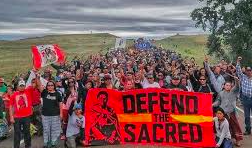
Then we spoke with three Chico activists: Chris Nelson, Dave Garcia, and Jake Davis. We asked them about what they see as the challenges and problems resulting from Donald Trump's recent executive orders and actions on the environment, which range from stifling the scientific evidence of climate change to putting a climate denier in charge of the EPA. They spoke eloquently about the damage that is being done by the president but also described their determination to carry on and ultimately prevail in important environmental and social causes.
Listen to the program; click below.
Listen to the program; click below.
ECO 402 EARTHJUSTICE
31 JANUARY 2017

Our guest was Abigail Dillen, Vice President of Litigation for Climate and Energy for Earthjustice, which uses legal avenues and lawsuits to protect the environment and humans in a world of increasing threat. She works from the San Francisco office, leading the organization’s legal advocacy to achieve the shift from fossil fuels to 100% clean energy. She spoke with us about a number of Earthjustice’s priorities, including legislation introduced in the new congress to undo critical and clean air and water protections. Toward the close of the interview, she gave us her thoughts on the role activists can and must play as climate deniers have taken over the federal government. Contact and/or donate to Earthjustice.
Listen to the program, click on the link following.
Listen to the program, click on the link following.
ECO 401 FAKE SILK
24 JANUARY 2017
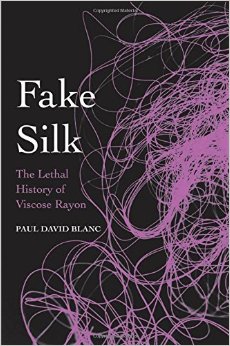
Our guest on this program was Dr. Paul Blanc, professor of Occupational and Environmental Medicine at UCSF, author of a book titled Fake Silk: The Lethal History of Viscose Rayon. He told us about a synthetic fabric that we thought was a thing of the past: rayon. Although it has been replaced for many uses by other synthetic fabrics, Paul told us that its central ingredient, cellulose viscose, is still around and has a long history of damaging the health of workers who are exposed to the fumes of its primary chemical ingredient, carbon disulfide. He told us about a long history of businesses and governments ignoring or covering up those effects. We also spoke to him about his earlier book How Everyday Products Make People Sick and about what people can do to protect themselves and their families. You can read more about his work on his blog for Psychology Today. <www.psychologytoday.com/blog/household-hazards>
Listen to the program. Click below.
Listen to the program. Click below.
